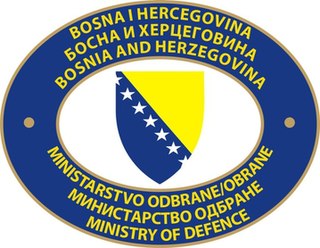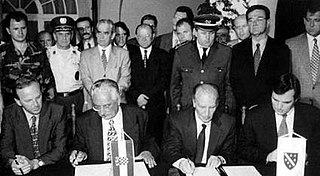
The Army of the Republic of North Macedonia is the military of North Macedonia. The army is organized, prepared and trained to conduct armed struggle and combat and other actions to achieve its constitutional function of defending the independence and territorial integrity of North Macedonia. The army consists of the ground forces and the air force, which are further divided into branches and services. Being landlocked, it didn't have a navy. The army has a permanent composition and reserve forces. Since 2005, it is a fully professional defense force compatible with NATO standards. On 27 March 2020, North Macedonia joined NATO as the 30th member.

DynCorp, formally DynCorp International, was an American private military contractor. Started as an aviation company, the company also provided flight operations support, training and mentoring, international development, intelligence training and support, contingency operations, security, and operations and maintenance of land vehicles. DynCorp received more than 96% of its more than $3 billion in annual revenue from the U.S. federal government. The corporate headquarters were in an unincorporated part of Fairfax County near Falls Church, Virginia, while the company's contracts were managed from its office at Alliance Airport in Fort Worth, Texas. DynCorp provided services for the U.S. military in several theaters, including Bolivia, Bosnia, Somalia, Angola, Haiti, Colombia, Kosovo and Kuwait. It also provided much of the security for Afghan president Hamid Karzai's presidential guard and trained much of the police forces of Iraq and Afghanistan. DynCorp was also hired to assist recovery in Louisiana and neighboring areas after Hurricane Katrina. The company held one contract on every round of competition since receiving the first Contract Field Teams contract in 1951.

A private military company (PMC) or private military and security company (PMSC) is a private company providing armed combat or security services for financial gain. PMCs refer to their personnel as "security contractors" or "private military contractors".

KBR, Inc. is a U.S. based company operating in fields of science, technology and engineering.
Academi, formerly known as Blackwater, is an American private military contractor founded on December 26, 1996, by former Navy SEAL officer Erik Prince. It was renamed Xe Services in 2009, and was again renamed to Academi in 2011, after it was acquired by a group of private investors. In 2014, Academi merged with Triple Canopy to form Constellis Holdings.

The Defense Logistics Agency (DLA) is a combat support agency in the United States Department of Defense (DoD). The agency is staffed by over 26,000 civilian and military personnel throughout the world. Located in 48 states and 28 countries, DLA provides supplies to the military services and supports their acquisition of weapons, fuel, repair parts, and other materials. The agency also disposes of excess or unusable equipment through various programs.
The Vinnell Corporation is an international private military company based in Herndon, Virginia, United States, specializing in military training, logistics, and support in the form of weapon systems maintenance and management consultancy. Vinnell Corporation is a subsidiary of Northrop Grumman Corporation. They are also party to other joint-venture companies, e.g. Vinnell-Brown & Root (VBR). The Vinnell Corporation was mentioned in Fahrenheit 9/11 for its connections to the Carlyle Group, George W. Bush, and the Saudi Royal family.
The Coalition Military Assistance Training Team (CMATT) was a part of the Coalition Provisional Authority created to organize, train and equip the Iraqi Army from 2003. It later became part of Multi-National Security Transition Command - Iraq (MNSTC-I). CMATT had initial plans to stand up nine infantry brigades in three divisions, a coastal defense force, and lay the framework of an aviation arm of the military.
Aegis Defence Services is a British private military and private security company with overseas offices in Afghanistan, the United Arab Emirates, Iraq, Saudi Arabia, Libya, Somalia and Mozambique. It is part of the Aegis Group of companies, which includes Aegis LLC, which is based in the United States. It was founded in 2002 by Tim Spicer, who was previously CEO of the private military company Sandline International; Jeffrey Day, an entrepreneur; and Mark Bullough and Dominic Armstrong, former investment bankers.

Carl Edward Vuono is a retired United States Army general who served as the Chief of Staff of the United States Army from 1987 to 1991.

The Iraqi Armed Forces are the military forces of the Republic of Iraq. They consist of the Iraqi Army, the Iraqi Air Force, and the Iraqi Navy. Along with these three primary service branches, there exists the Iraqi Counter Terrorism Service and the Popular Mobilization Forces. The President of Iraq acts as the supreme commander as outlined by the constitution.
SCG International was founded in 1996 to provide government and private sectors with domestic and international security, logistics and training services. After SCG and its former CEO Jamie Smith lost a $9.5 million lawsuit, the Virginian-Pilot reported that SCG was apparently defunct and that Jamie Smith had left the United States. In August 2012, the US Air Force debarred the company for a period of three years from any federal assistance.

Operation Summer '95 was a joint military offensive of the Croatian Army (HV) and the Croatian Defence Council (HVO) that took place north-west of the Livanjsko Polje, and around Bosansko Grahovo and Glamoč in western Bosnia and Herzegovina. The operation was carried out between 25 and 29 July 1995, during the Croatian War of Independence and the Bosnian War. The attacking force of 8,500 troops commanded by HV's Lieutenant General Ante Gotovina initially encountered strong resistance from the 5,500-strong Army of Republika Srpska (VRS) 2nd Krajina Corps. The HV/HVO pushed the VRS back, capturing about 1,600 square kilometres of territory and consequently intercepting the Knin—Drvar road—a critical supply route of the self-declared Republic of Serbian Krajina (RSK). The operation failed to achieve its declared primary goal of drawing VRS units away from the besieged city of Bihać, but it placed the HV in position to capture the RSK's capital Knin in Operation Storm days later.

The Ministry of Defence of Bosnia and Herzegovina is the governmental department in charge of the Armed Forces of Bosnia and Herzegovina and protection of Bosnia and Herzegovina from invasion and threats.

U.S. Army Southern European Task Force, Africa(SETAF-AF), is the United States Army service component command of United States Africa Command, and is headquartered at Caserma Ederle and Caserma Del Din, Vicenza, Italy.

The Split Agreement or Split Declaration was a mutual defence agreement between Croatia, the Republic of Bosnia and Herzegovina and the Federation of Bosnia and Herzegovina, signed in Split, Croatia on 22 July 1995. It called on the Croatian Army (HV) to intervene militarily in Bosnia and Herzegovina, primarily in relieving the siege of Bihać.

Triple Canopy, Inc., is an American private security company and private military company that provides armed security, mission support, and risk management services to corporate and government clients. The firm was founded in May 2003 by United States Army Special Forces veterans, including former Delta Force operators. In June 2014, the firm merged with rival security contracting firm Academi, formerly Blackwater, to form Constellis Group, with Craig Nixon, the former CEO of Academi, becoming the CEO of Constellis Group, and training facilities being consolidated at the existing Academi training facility in North Carolina. It was staffed by, among others, a number of former Army Special Operations personnel, Green Berets, Rangers, SEALs, MARSOC Raiders, other special operations personnel, and several law enforcement officers. At the time of the merger, over 5,000 employees were working for Triple Canopy.
Foreign support in the Bosnian War included the funding, training or military support by foreign states and organizations outside Yugoslavia to any of the belligerents in the Bosnian War (1992–95).











